Missy Elliott: The Legend Returns
The artist, who's ready to drop long-awaited new music, redefined hip-hop vocally and visually—and lifting up other artists only burnishes her superstar legacy.
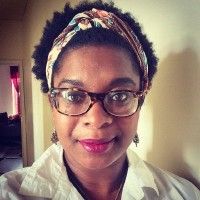
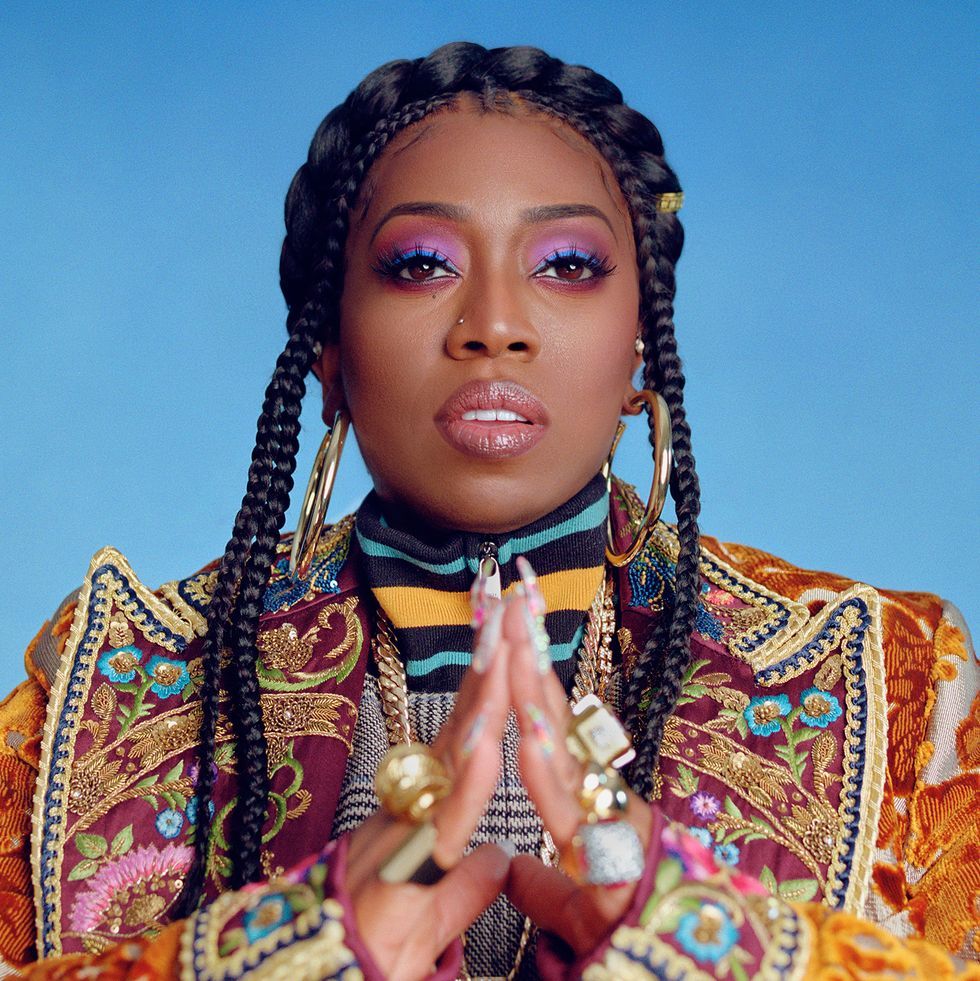
This spring, Melissa Arnette Elliott stood before a mass of Berklee College of Music students and faculty in Boston. She requested a moment to gather herself. She closed her eyes and took a deep breath, and tears began to fall freely over her smiling face. She opened her eyes. She began to speak to the graduating class, herself among them, just before being awarded an honorary doctorate.
A few days later, I watched Elliott’s speech on YouTube from my living room couch. I scrolled back to when she closed her eyes and counted the seconds until she spoke again. Altogether, there were 20 seconds of what I assumed was silent meditation, perhaps gratitude, in service to a life so successful, it had fashioned itself into this spectacular moment.
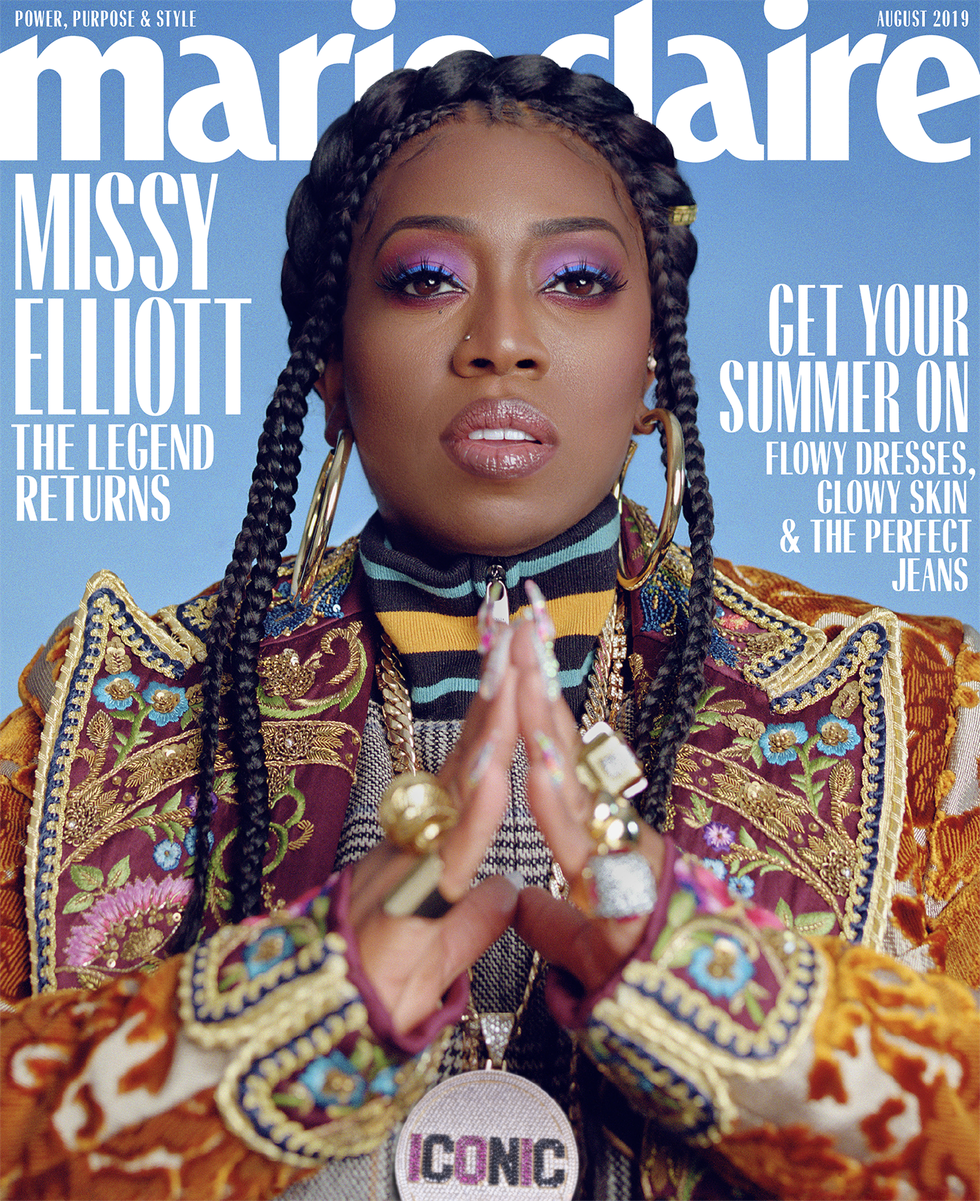
Dolce & Gabbana orange coat, tweed coat, and plaid pant; Jennifer Fisher earrings; Left hand: David Webb gold leaf ring, Jennifer Fisher gold ring on pinky finger; David Webb rectangular gold-diamond-and-ruby ring (on ring finger), David Webb rectangular gold-diamond-and-ruby ring (on pinky finger); Jennifer Fisher gold cylinder ring and gold tube ring. Iconic Necklace Missy’s Own.
Two weeks later, at a recording studio just outside Atlanta, where she’s working on a long-anticipated seventh album, I ask Elliott if she remembers standing there for those 20 seconds. She hadn’t known it had been quite that long. I confirm. I counted to make sure. Her eyelids, painted green and shimmering under the overhead lights, flutter a few times while she thinks about it more.
“I didn’t even realize,” she says. “You know what’s so funny? I wrote a speech and got up there and choked up, and before I knew it, I was like, ‘Oh my God, where’s the paper?’ And it was just crumbled up on the podium.” However, she hadn’t closed her eyes to remember her speech or make a harried backup plan for giving one on the fly. She’s Missy Elliott. She went somewhere else entirely.
“I went to the side of my grandmother’s house where I used to play church. I used to shout and sing all kinds of gospel songs. Ones I had made up, ones that existed in the church...I was at that place.” Elliott considers herself a very spiritual person. For her, “God is real because I went to that place and felt like he had his hands on me from a child.”
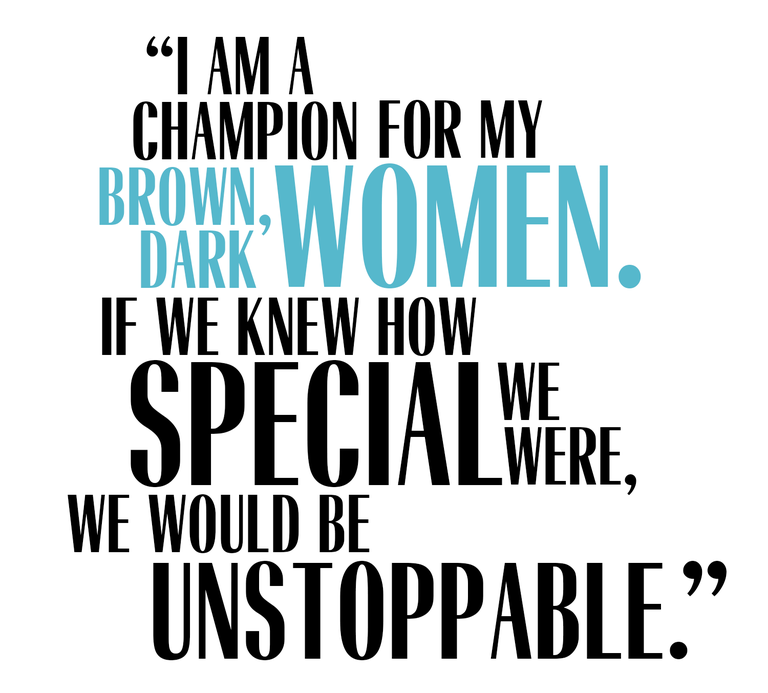
Whether you believe in God or not, something about Elliott’s ability to push the boundaries around recording and visual art feels beyond human ability. Depending on who you ask or where you look, she’s reliably ranked somewhere within the top five best-selling female rappers of all time. Nominated 22 times, she’s won four Grammy awards and sold over 30 million records worldwide. She changed the genre. Inventive, sly lyrics. Effortless flow. Body positive before the term was created. Above all else, she represents Fun with a capital F and Mischief with a capital M. She’s like the Cheshire cat, enticing you to smoke a little, dance a little, relax, forget your troubles, go on a weird adventure down the rabbit hole. When I saw Elliott’s video for “The Rain,” off of her 1997 debut album, Supa Dupa Fly, for the first time, it was like every element of my happiest hidden self coming together. I loved how weird it was, with the fish-eye lenses, blow-up black suits, sunglasses that went over the top of your head, and jerky, almost manic dancing.
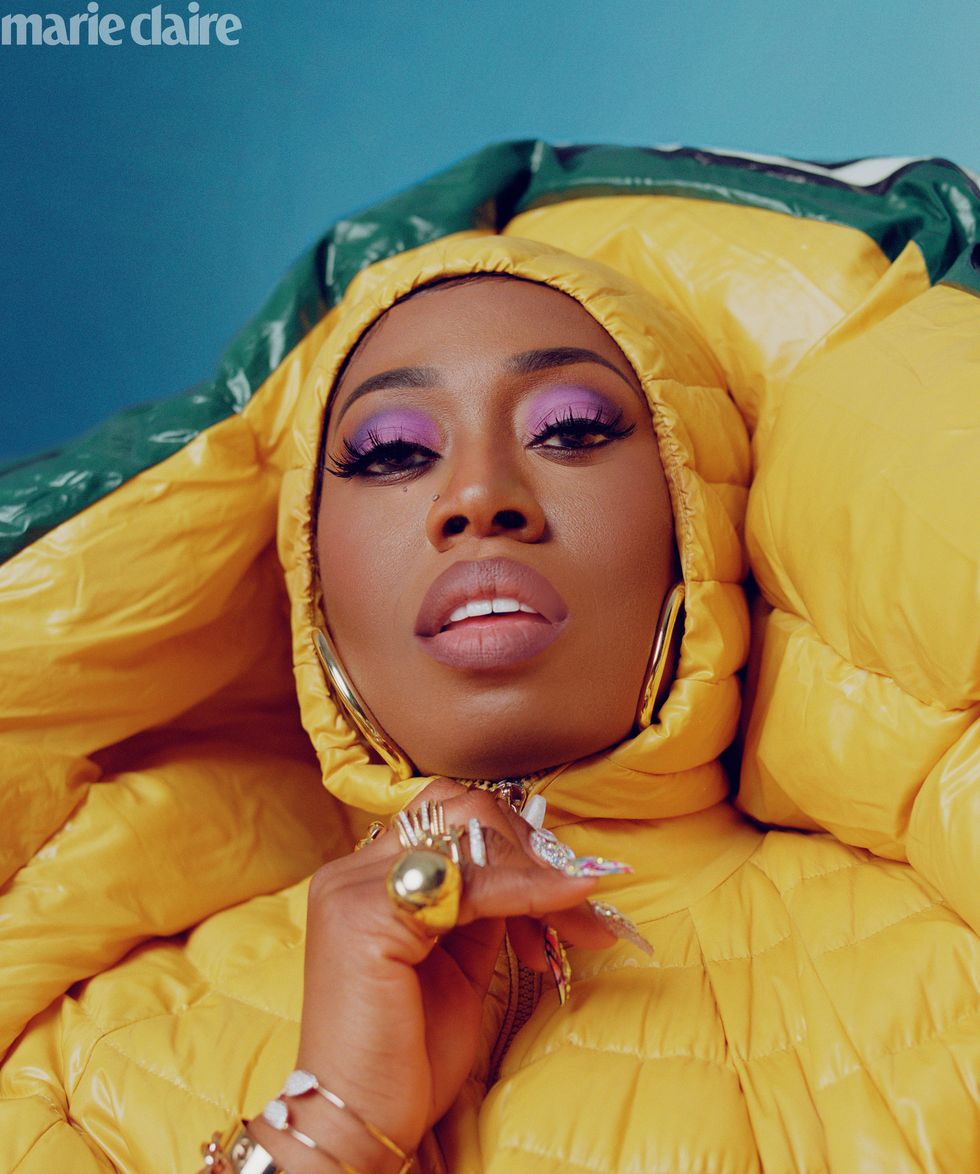
Moncler Pierpaolo Piccioli quilted dress; Jennifer Fisher double-chain-link ring (on middle finger); Pomellato rose-gold-and-white diamond ring (on middle finger); David Yurman yellow-gold-and-diamond ring (on ring finger); Cartier dome ring (on pinky); Jacob & Co. safety-pin cuff bracelet; Cartier yellow-gold love bracelet; Pomellato rose-gold chain bracelet.
It’s only now that she realizes her early innovations and creativity were ahead of their time or the influence they would have on other artists. “I was just going, going, going,” she says. “It wasn’t resonating what was happening. After I did the Super Bowl [in 2015], my friends called me and they are like, ‘So, what you about to do?’ I’m here mopping my floor, and I got to wash the dogs. And they are like, ‘What? You just finished doing the Super Bowl.’ And the same thing happened...I was in the car with Michelle Obama [for ‘Carpool Karaoke’ in 2016], and they called me like, ‘Girl, we got to celebrate; that’s huge!’ And I’m like, ‘I’m watching a movie on Netflix.’ Now that I’ve had a chance to slow down, I look back at stuff, and I look back at my ‘She’s a Bitch’ video [1999], and at the time I didn’t even think about it. But I look at it now and I’m like, ‘This is still so many years ahead.’” Now, new Missy music is coming. She says it’s time to make street dudes enjoy dancing again, like in the days of Soul Train. “It’s okay,” she says. “It’s not corny.”
Stay In The Know
Get exclusive access to fashion and beauty trends, hot-off-the-press celebrity news, and more.
About two weeks before I sat down with Elliott, one of her fans tagged her in a tweet about how much she missed the singer-rapper-producer-icon and couldn’t wait for her to come back to the music industry. With all the genuine humility the public has come to expect from her, Elliott responded that although she’d never left, she had hot new music on the way. Then she quickly added below her initial comment, “Don’t sleep on me,” followed by a series of laughing and smiling emojis. The tweet reads as oddly misplaced, though it isn’t. It’s just hard to believe anyone would ever dare sleep on Missy “Misdemeanor” Elliott.
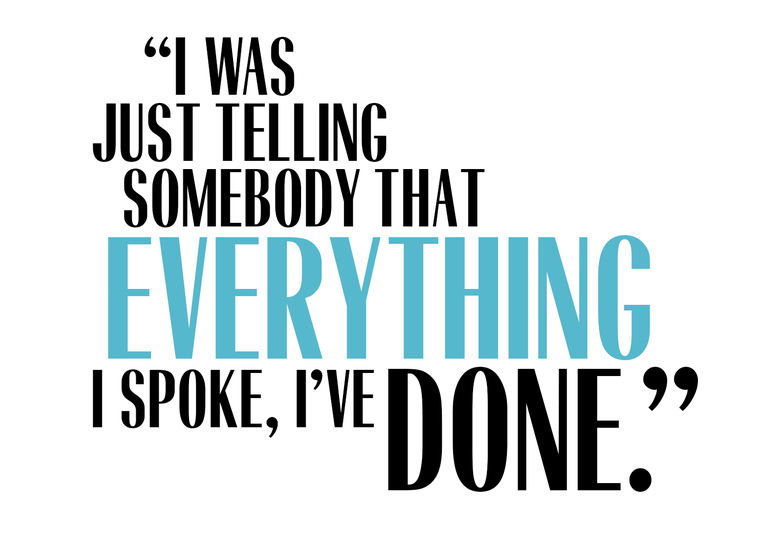
She says she’s used to the doubt in her ability or trajectory. She knew what she wanted to do for the rest of her life when she was in kindergarten. “This is why you have to listen to kids. I knew what I wanted. I remember.” Elliott says her teacher asked the class what they wanted to be every week. (Not surprising, as kids’ inclinations for their futures change rapidly.) Her classmates’ minds did change often, though the list of possible futures they considered stayed roughly the same: “I want to be a fireman.” “I want to be a teacher.” “I want to be a doctor.” “I want to be a lawyer.” Elliott’s answer was consistent each week: “‘I’m going to be a superstar,’ and the whole class would bust out laughing.” Elliott’s teacher, Mrs. Gardner, would admonish the class, insisting that if Elliott wanted to be a superstar, it was possible that’s exactly who she would become. The young Elliott was unfazed. Her certainty in her talent and her commitment to music felt tangible to her and within her grasp. She didn’t wish ill on any of her classmates—but she didn’t forget them either. She clasps her hands in front of her, and I can’t help but notice her neon nails. Framed against the white of her T-shirt, they look brighter than fluorescent. Like Elliott, they’re subtly more than they appear to be at first. She looks away and sits further back in her chair. “I wonder, do those kids remember me? Because I remember all of them. I have a picture, and I remember their names. They would laugh because it just seemed impossible. And then as time went on...and this is funny!” She stops herself. Elliott is a natural storyteller, but she’s also a bit shy. When she notices herself getting excited or carried away, she tends to pause and check in with other parties. I find myself reassuring her that I want to hear her story, that that’s what I’m there for. In fact, I’m enjoying myself. She looks down and smiles. “Sometimes I get to talking.” She continues.
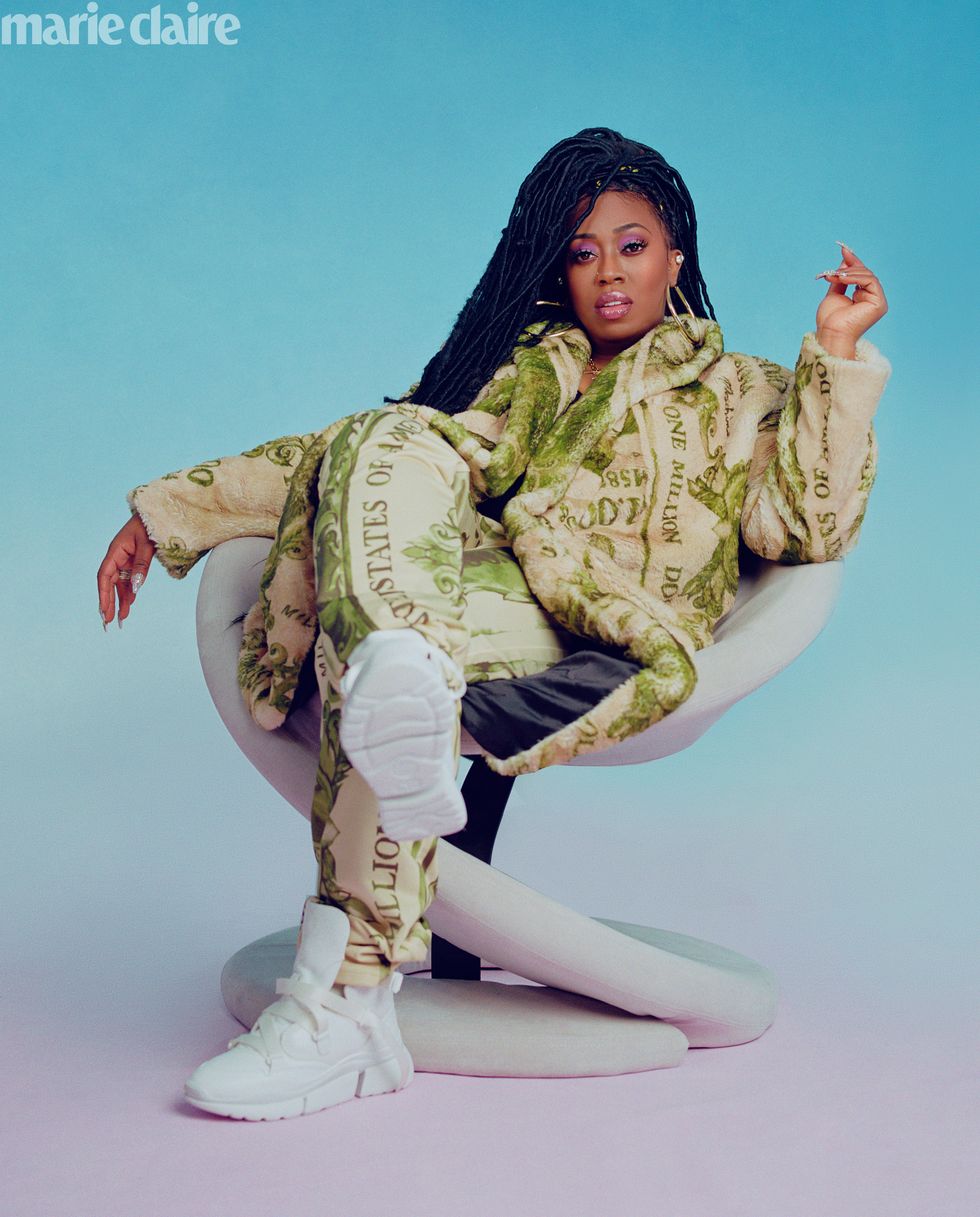
Moschino jacket and pants; Jennifer Fisher hoop earrings; Chloe shoes; Diamond studs Missy’s own
“It’s funny because I was just telling somebody that everything I spoke, I’ve done. And that’s how powerful the tongue is....I used to sit in the house and act like I was having conversations with Janet and Michael and Madonna and whoever. I then would go and say my thank yous for award shows that I hadn’t made it to yet. I had speeches, and I would be in the mirror thanking my mama.” Speaking desire into existence is not a new idea by any means, but it sounds real when she says it. There isn’t any other way to hear it from her. Elliott was so deeply convinced of her chart-topping goals, she never had any other kind of job or career path in adulthood. There was no money to support her artist’s dream. She had no family member who could make the right connections or help her get a head start in her highly competitive chosen field. There was her talent, and there was her faith.
“Trust me, I was broke. And my family would be like, ‘You better find something to do.’ They told me to go in the Army. I’m like, ‘I’m too fat to go in the Army. Where I am running to?’ Everything just seemed so impossible at the time because we didn’t have the technology to be able to reach out and put your stuff online and people get a chance to see it. So you have to be at the right place at the right time.” She insists Virginia, where she grew up, wasn’t a place she could develop her career, but it did happen to be the place where she would meet the friend who would go on to become her most consistent producing partner, Timbaland. There was her R&B group Fayze, work as a songwriter for Mary J. Blige, SWV, and Faith Evans (and eventually Whitney Houston, Janet Jackson, and Beyoncé), and a move to New York.
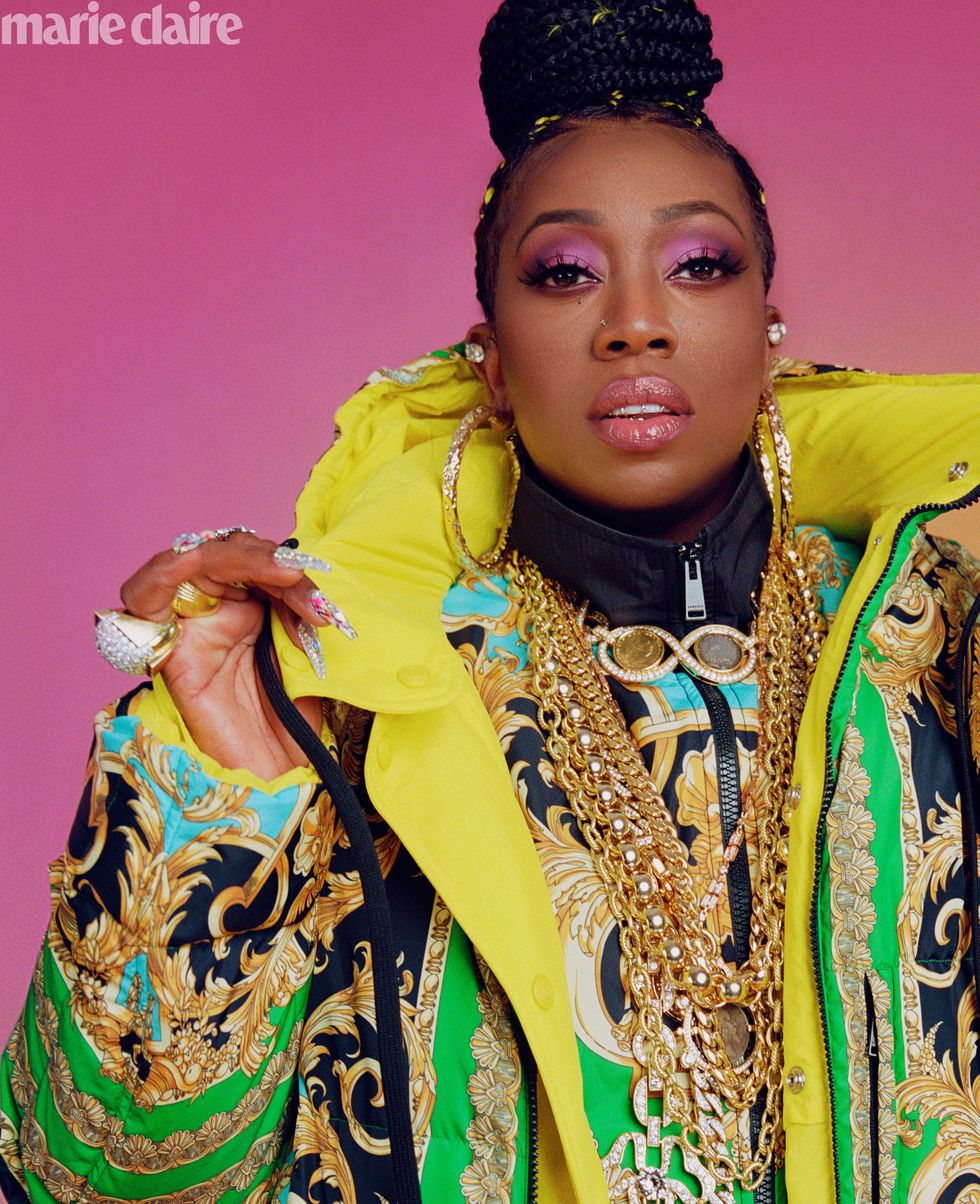
Versace puffer coat and jacket; Jennifer Fisher earrings; Bulgari coin necklace; David Yurman chain necklace; Andreas Kronthaler for Vivienne Westwood leaf necklace; David Webb rings
The music she created became her refuge. Life had not been easy for Elliott pre-stardom. In her 2011 VH1 Behind the Music documentary, she and her mother detail how her father was physically abusive to her mother, as well as the sexual abuse by a cousin she experienced when she was eight. In the end, they left their home in Portsmouth, Virginia, when Elliott was 14. When she spoke her wants and desires for the future, her mother was always considered in those requests. “I told my mother, ‘I’m going to buy you a house, and I’m going to buy you an elevator incase your legs start hurting.’ And she would laugh and be like, ‘All right, okay.’” Elliott smiles. “But when I got my first check, I didn’t even buy myself a house first. I bought my mother a house. Put a Bible in the soil and built it from the ground up.” Of all the things we’ve discussed so far—her awards, videos, collaborations—this is the accomplishment she speaks of with the most visible pride. In this moment, she is not shy.
Supporting her loved ones and developing other artists are the two realms where Elliott is most comfortable. I remember listening to my older cousins’ and younger aunts’ CDs as a pre-teen: Aaliyah, Total, Ciara, Tweet, Nicole Wray, etc. All of them gorgeous black women of enormous talent, and all of them associated with or directly developed by Elliott. What struck me was how many of these women were presented as beautiful and capable with their deep or dark black skin. By that age, I had already been inundated with the idea that, according to music videos, the most beautiful shade of black was furthest from its name. Then there was Tweet. I thought I’d never seen anyone so beautiful sing so pretty. Elliott smiles at the mention of her friend’s name.
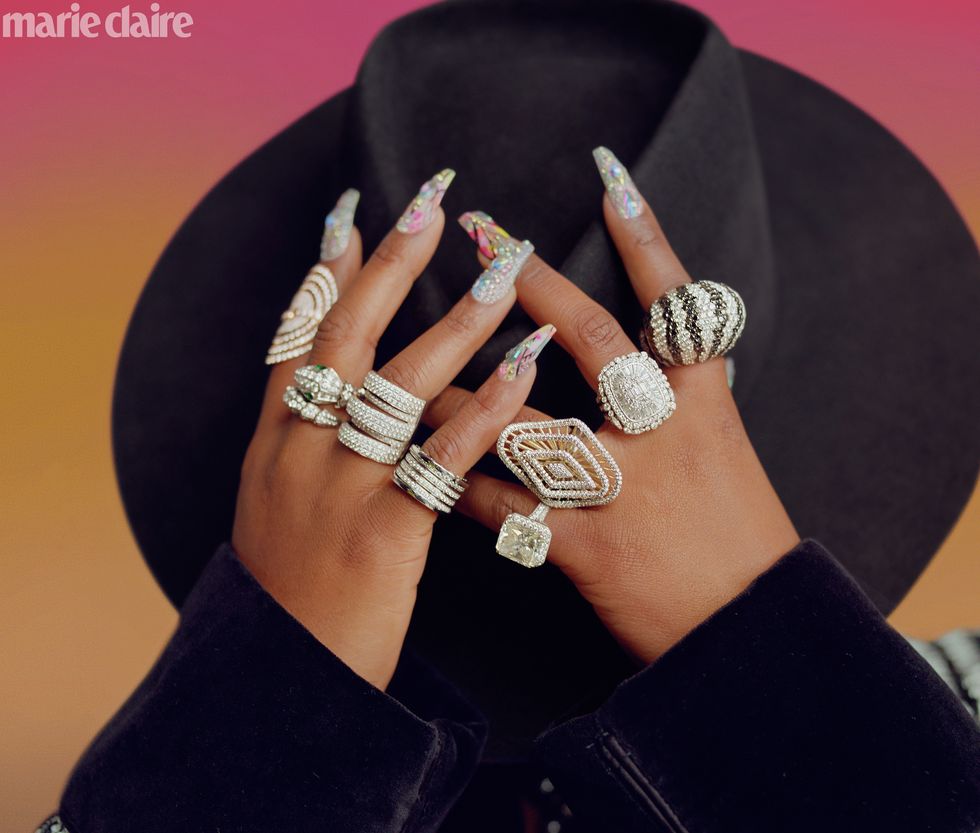
Dolce & Gabbana jacket; Jacob & Co. pavé diamond cocktail ring (on left finger) and zebra dome ring; Bulgari serpent ring (on left finger); Bulgari white-gold-and-diamond ring (on left pinky); All other rings Elliott’s own.
“When I saw Tweet, it was like something is so special about her that is so different,” Elliott recalls. “I remember watching the way she played the guitar, and I said, ‘This is interesting. She’s not playing it upright; she’s playing it flat.’ But the reason is so she could see the strings because she taught herself how to play. And I was like, ‘This is amazing to me.’” Elliott wanted to work with the young woman immediately. And she did. This was normal for her. If she wanted to work with an artist, she would not give up until she worked with that artist. The drive to develop other artists is what convinced her to sign her record deal with Elektra, the only one that gave her what she wanted: her own label deal. That’s how we got Supa Dupa Fly. “When we were up in Rochester, [Virginia,] we didn’t listen to the radio, we didn’t watch videos, so we didn’t hear nor see. We created a sound that we didn’t even know we were creating. It’s just that we didn’t know what was hot, so we just was creating music,” Elliott says. “I wish I could get back to that space of not seeing or hearing, because when you see and hear, you start to concentrate, and then you are afraid to try something new because it don’t sound like anything else.”
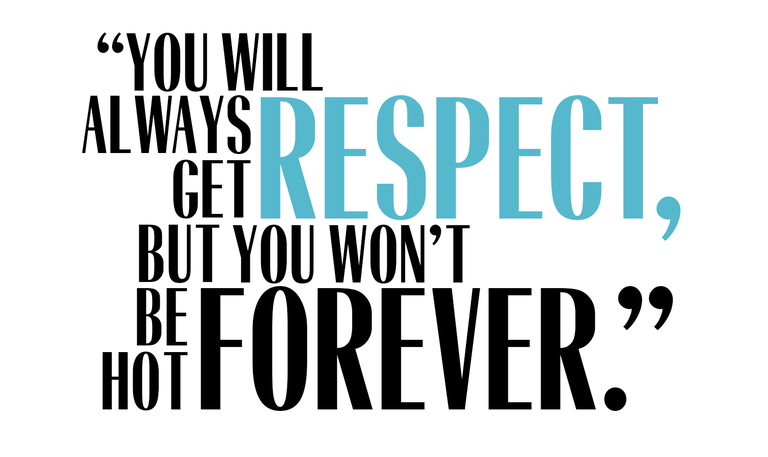
With God’s hand in her hand, her other hand is open for anyone with talent, drive, and something different to say. “Whenever God decides to call, I want to have that legacy of being able, not just music or videos that people thought were great,” she says. “Mary [J. Blige], Faith [Evans], Puff [Sean Combs], all of them taught me so many things. I want to be that person that people say, ‘Hey, Missy said she did it like this.’ If a billionaire told me they read 400 books to become a billionaire, I’m going, ‘Where is the Barnes & Noble at? Let me get 400 books.’ And just giving wisdom, because that blessing don’t come for you, like my grandma said, to keep it for yourself. It is to share. And hopefully I have done that. I do want to make the generation behind feel like, don’t be afraid, because we are in a time where so many people can be artists. Now you can just post up, and if it gets to the right person, then it’s just viral. I want to be able to encourage those who don’t go viral....A lot of people out there that have 452 or 100 followers may be talented. I want them to not feel like they have to do what everybody else is doing to gain that attention. Just be you. It’s going to catch hold somewhere.”
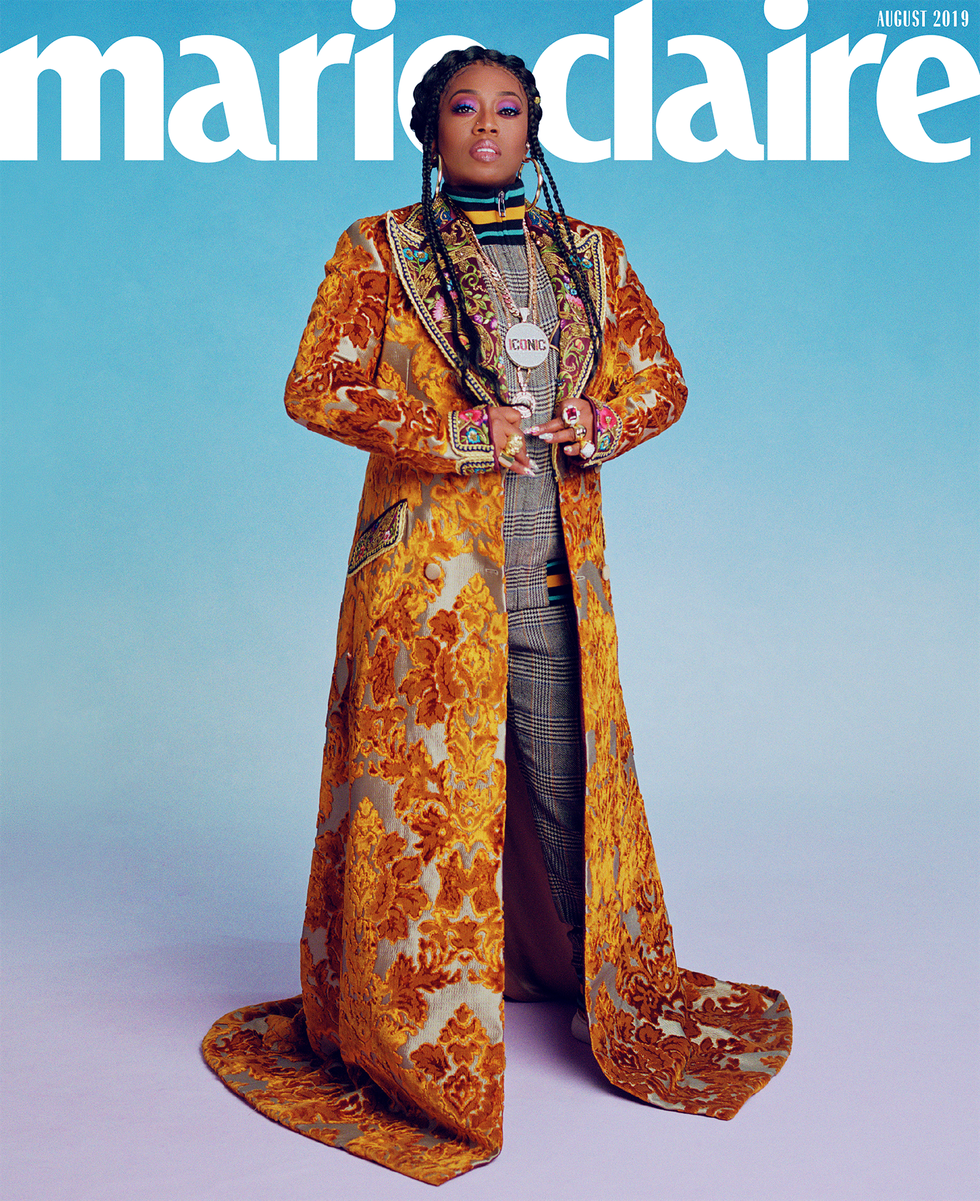
Dolce & Gabbana orange coat, tweed coat, and plaid pant; Jennifer Fisher earrings; Left hand: David Webb gold leaf ring, Jennifer Fisher gold ring on pinky finger; David Webb rectangular gold-diamond-and-ruby ring (on ring finger), David Webb rectangular gold-diamond-and-ruby ring (on pinky finger); Jennifer Fisher gold cylindar ring and gold tube ring. Iconic Necklace Missy’s Own.
On May 11, Elliott received her doctorate in music. On June 13, she became the first female hip-hop artist inducted into the Songwriters Hall of Fame. On July 1, she turned 48. Her legacy is undeniable, and her will to keep making music is unstoppable. Through doubt, hardship, or illness, she insists she feels crazy if she doesn’t make it to the studio every single day. The songs are there, and the time is coming. When I ask her my final question—what she wants us all to be thinking when we finish listening to her next album for the first time—she closes her eyes again and thinks. There are no tears this time but a small smile spreading into that inimitable grin right before she answers: “There’s no one like Missy. No one.”
[image id='a32f3380-d26a-4658-ac80-385b12e43fa2' mediaId='a0ae3555-d4e4-4df0-8c97-a3534bb9d314' align='center' size='medium' share='false' caption='' expand='' crop='original'][/image]

This article originally appears in the August 2019 issue of Marie Claire.
Photographer: Micaiah Carter / Fashion Editor: June Ambrose / Hair: Kellon Deryck / Makeup: Alexandra Butler / Manicure: Elizabeth Salcedo / Set Design: Lauren Nikrooz at Magnet Agency / On-Set Production: Elise Connett at 143 Productions
Ashley is a writer, host, and educator who lives in Indianapolis, Indiana. Her memoir, Somebody’s Daughter, will be published by Flatiron Books on June 1, 2021.
-
 The "Frightening" Easter Prank William Played on Eugenie
The "Frightening" Easter Prank William Played on Eugenie"Prince William has just stood on a chair and bitten the mouse's head off."
By Amy Mackelden
-
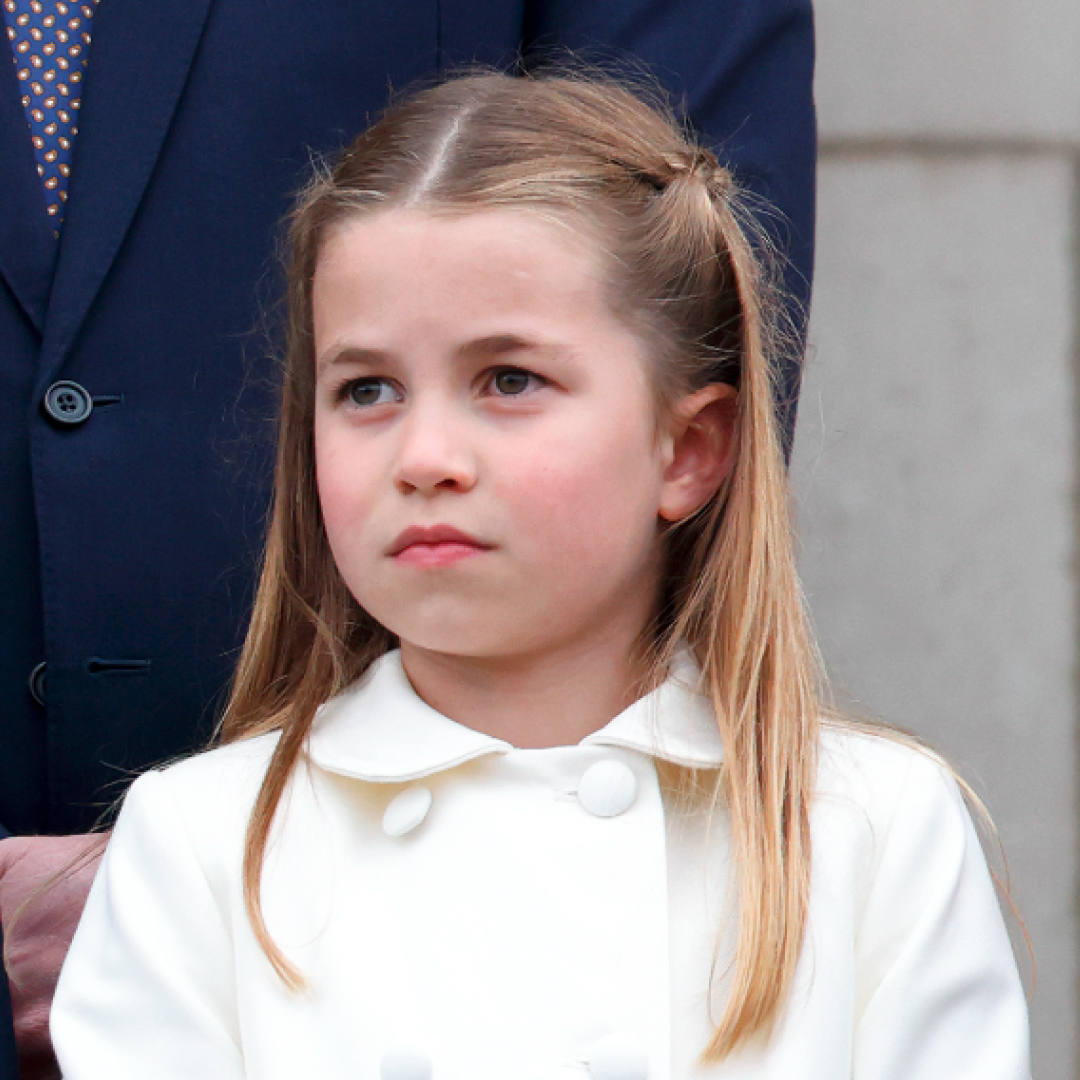 A Resurfaced Photo Reveals Charlotte's Royal Lookalike
A Resurfaced Photo Reveals Charlotte's Royal Lookalike"The Spencer genes are so strong."
By Amy Mackelden
-
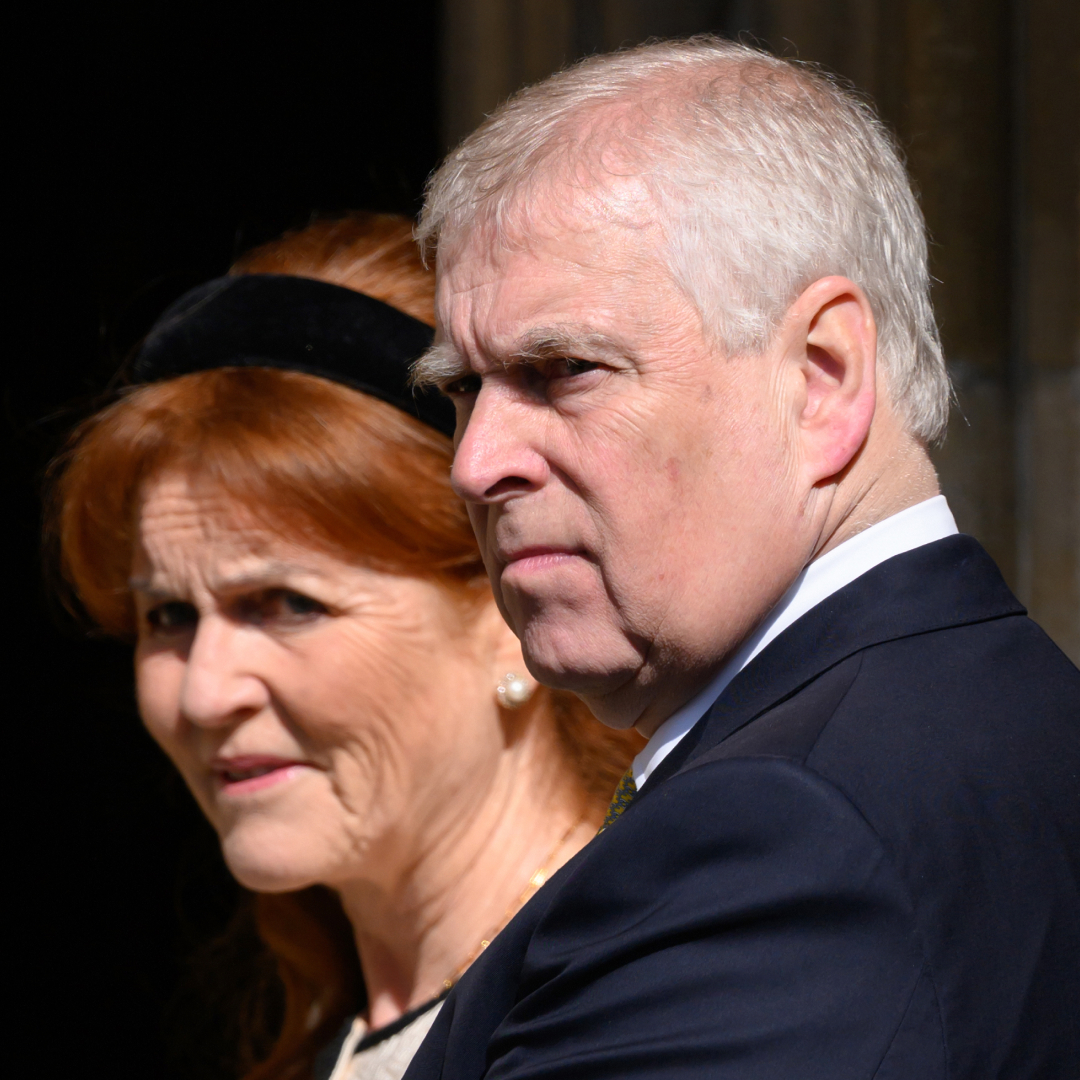 Why Prince Andrew Attended Royal Family's Easter Service
Why Prince Andrew Attended Royal Family's Easter ServiceIt was previously alleged King Charles's "patience was wearing thin" with his brother.
By Amy Mackelden
-
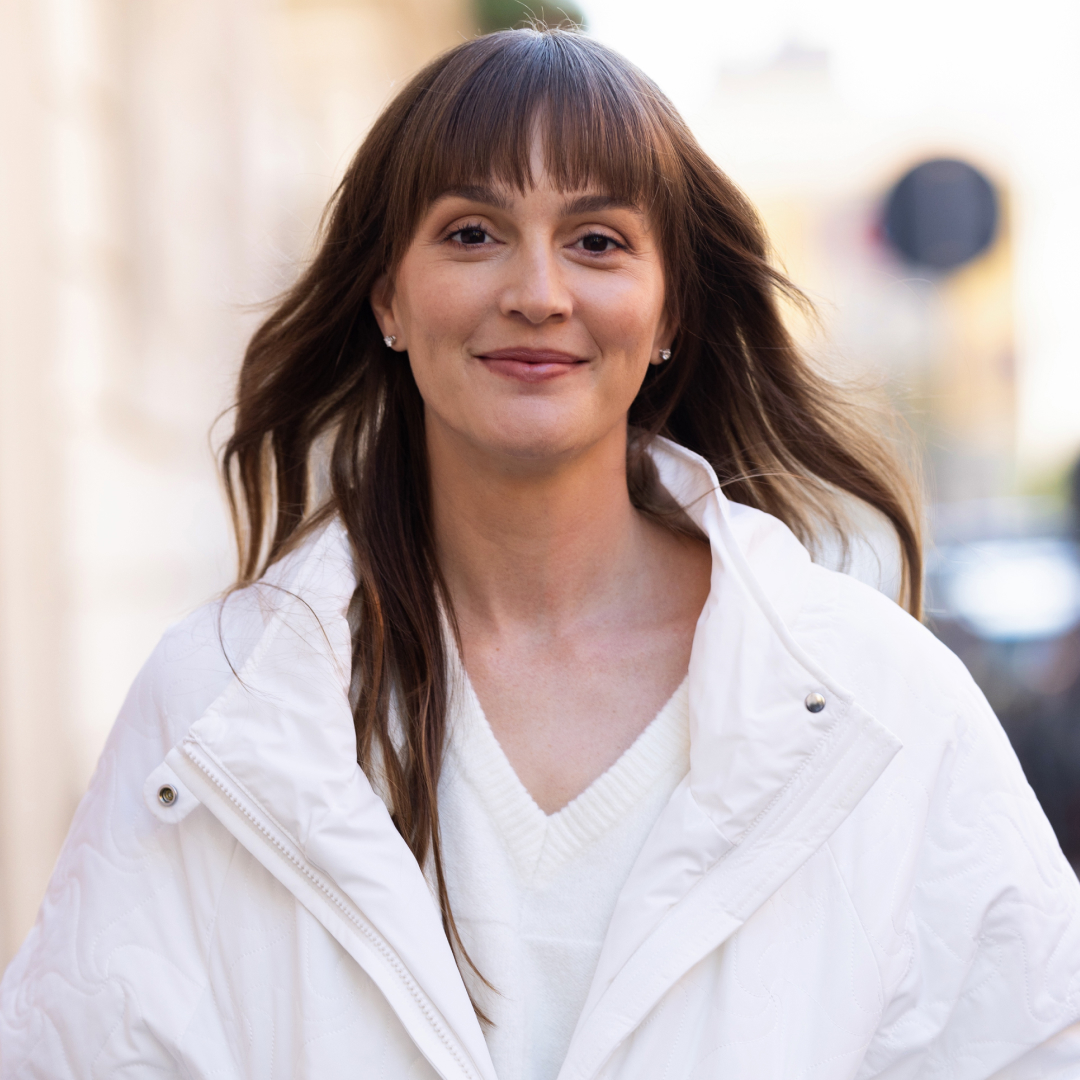 Leighton Meester's Music Climbs iTunes Chart After She Loses Home She Shared With Adam Brody in California Wildfires
Leighton Meester's Music Climbs iTunes Chart After She Loses Home She Shared With Adam Brody in California WildfiresThe 'Gossip Girl' star is following in Heidi Montag's footsteps.
By Amy Mackelden
-
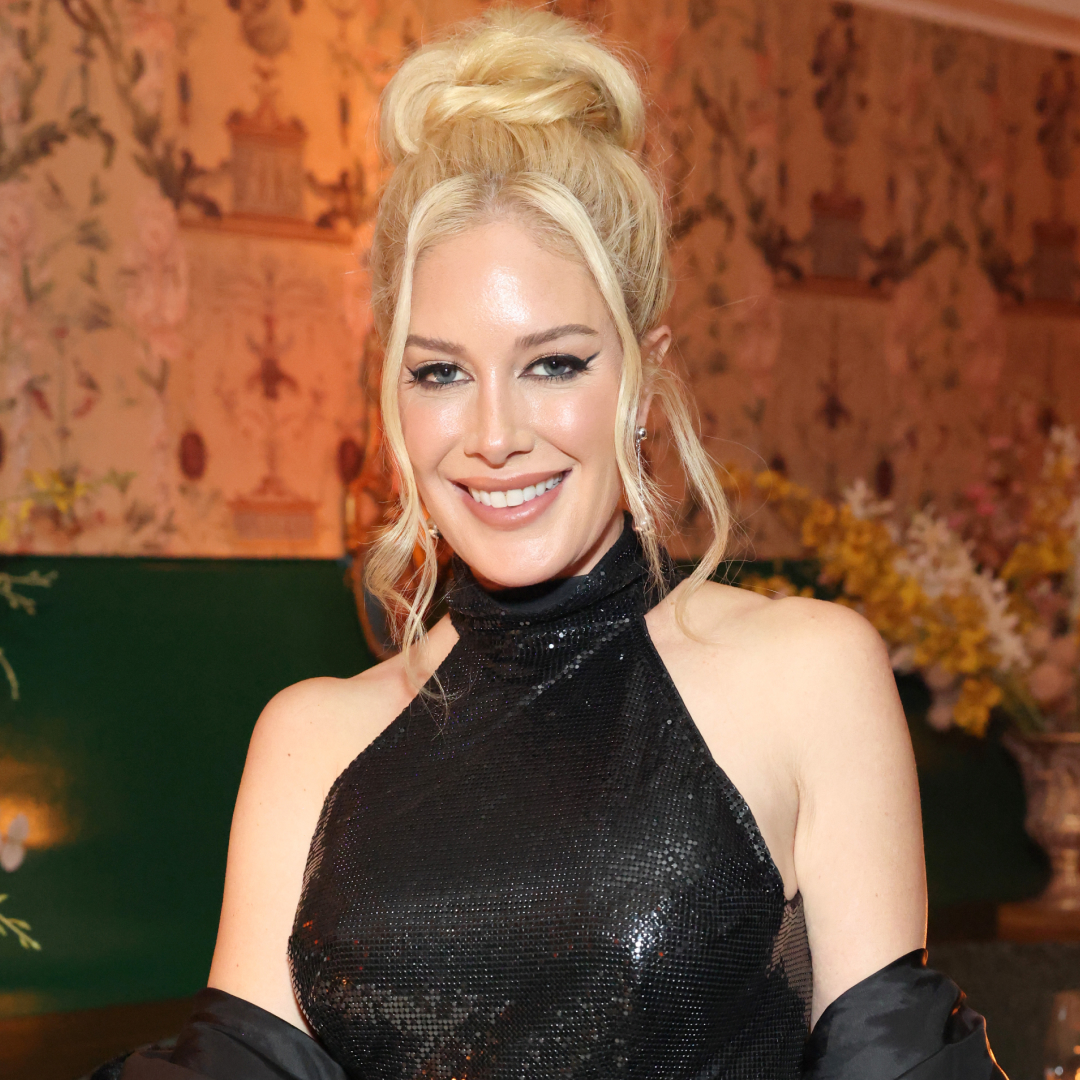 Why Heidi Montag's 2010 Album 'Superficial' Is Having a Celeb-Fueled Revival in 2025
Why Heidi Montag's 2010 Album 'Superficial' Is Having a Celeb-Fueled Revival in 2025Everyone from Emily Ratajkowski to Paris Hilton has helped the underrated record top the iTunes chart.
By Amy Mackelden
-
 Eva Mendes and Ryan Gosling Introduce the "Newest Member" of Their Family
Eva Mendes and Ryan Gosling Introduce the "Newest Member" of Their Family"I'm crazy about her and excited to share life."
By Amy Mackelden
-
 Jennifer Garner Is Reportedly Ready to Cut Ties With Jennifer Lopez, Unless Their Kids Are Involved
Jennifer Garner Is Reportedly Ready to Cut Ties With Jennifer Lopez, Unless Their Kids Are Involved"Her friends feel she shouldn't have allowed herself to get so involved."
By Amy Mackelden
-
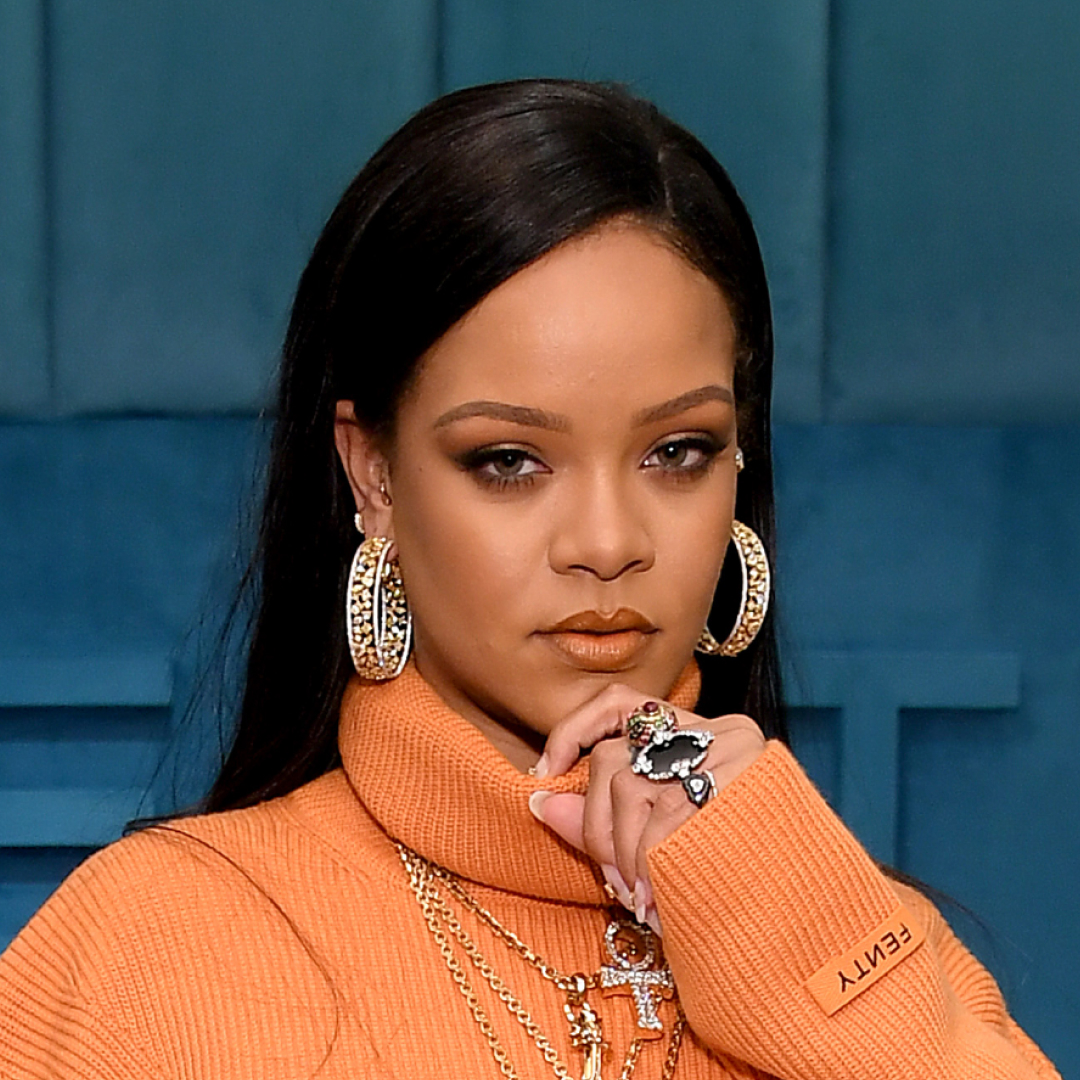 Rihanna Hints She's Retiring From Music and Moving on to More "Authentic" Projects
Rihanna Hints She's Retiring From Music and Moving on to More "Authentic" Projects"I always say music was the thing that got the attention, but God had other plans for me."
By Amy Mackelden
-
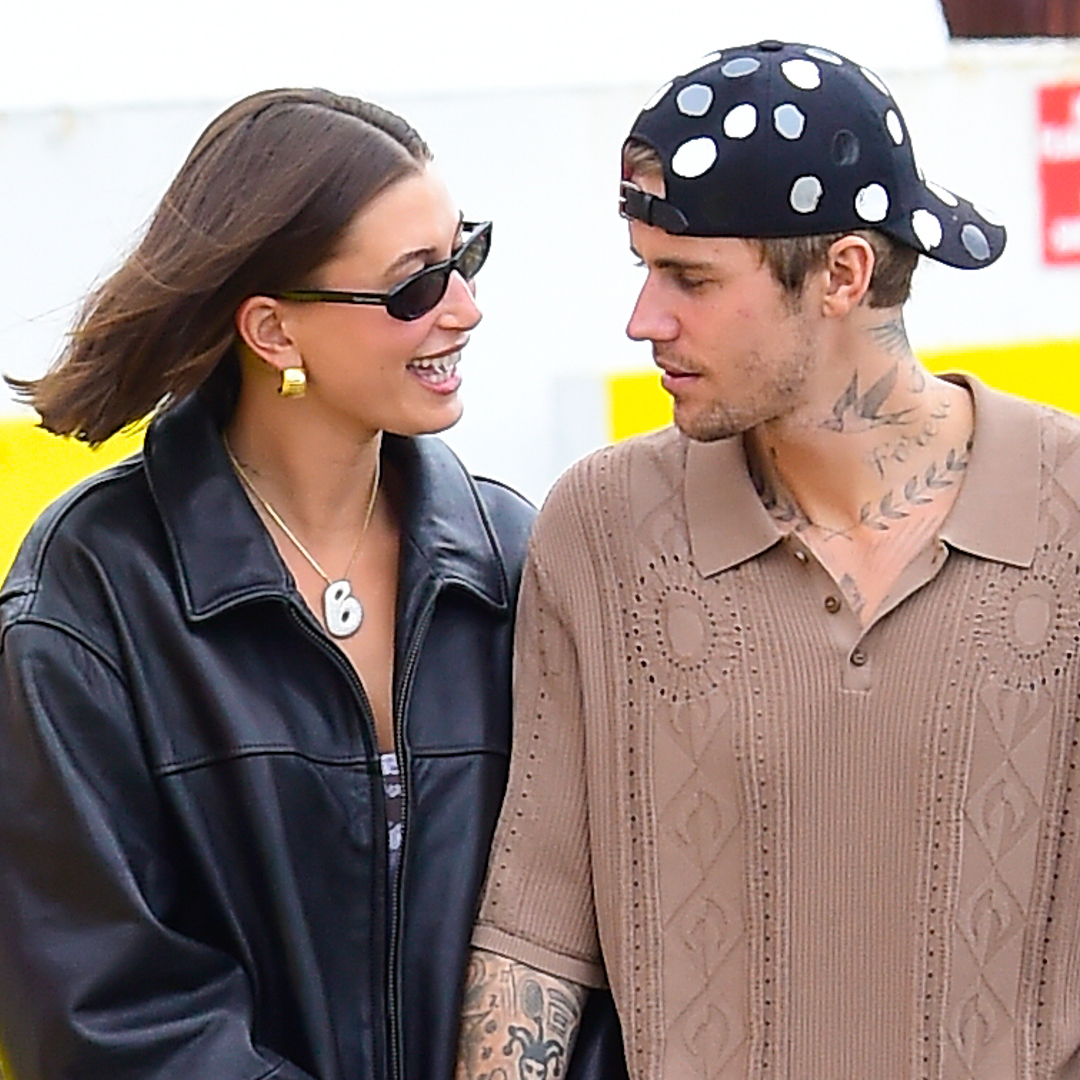 Hailey Bieber Shares Her First Photo of Baby Son Jack Blues Since Giving Birth—See the Sweet Shot
Hailey Bieber Shares Her First Photo of Baby Son Jack Blues Since Giving Birth—See the Sweet ShotSo freaking cute.
By Quinci LeGardye
-
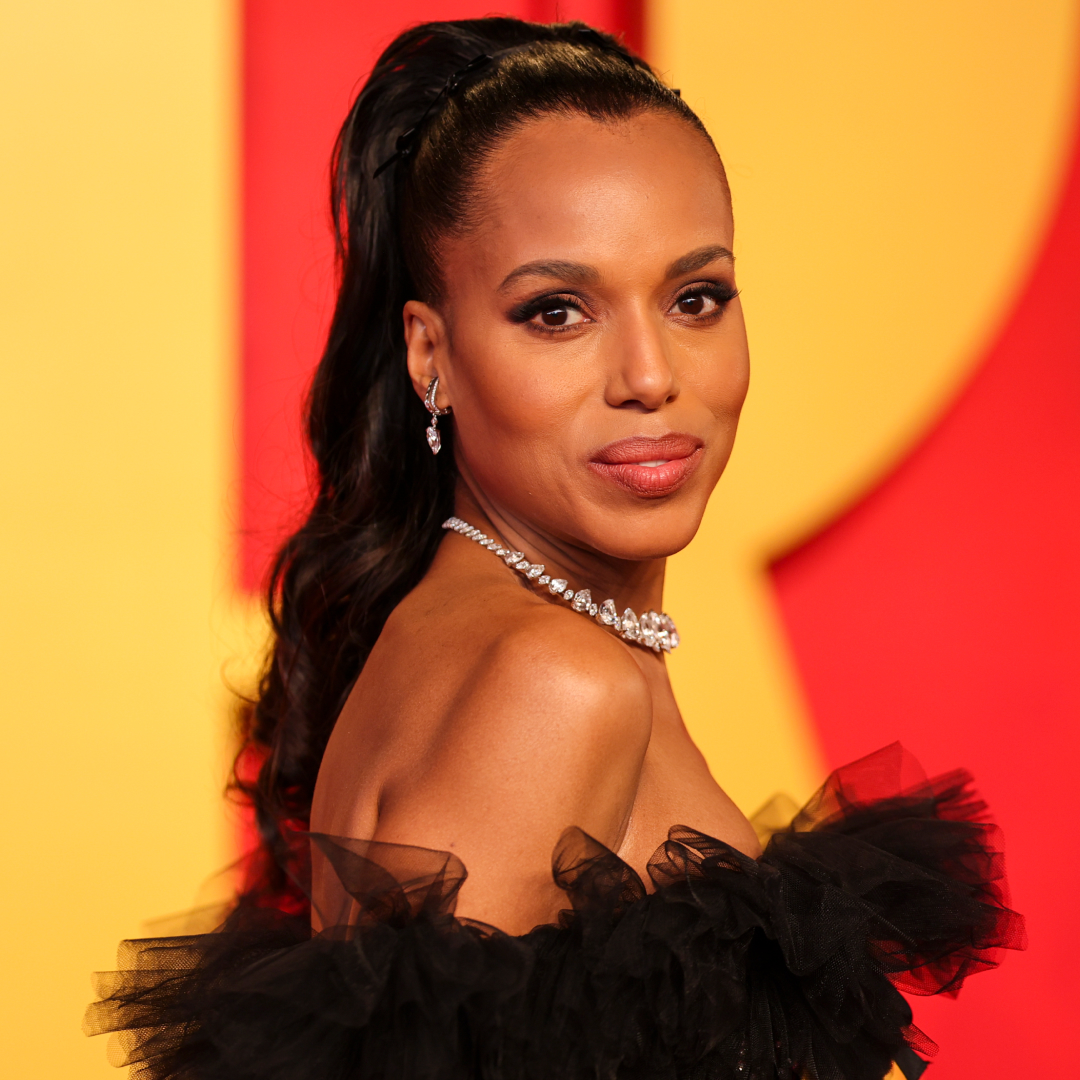 Actors Who Are Nothing Like Their Most Iconic Characters
Actors Who Are Nothing Like Their Most Iconic CharactersTalk about awards-worthy, transformative performances.
By Katherine J. Igoe
-
 Megan Thee Stallion Pays Homage to Britney Spears at the 2024 VMAs With a Snake—That She Demanded Be Taken Off Her
Megan Thee Stallion Pays Homage to Britney Spears at the 2024 VMAs With a Snake—That She Demanded Be Taken Off HerThe rap superstar hosted this year's award show and called back one of the pop icon's most memorable performances.
By Sadie Bell